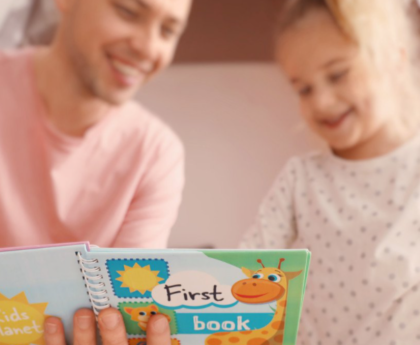Reading aloud to your child is one of the most supportive things you can do for his or her literacy development. Whether your child is an early reader or still a baby, engaging them in storytime instills some of the fundamental skills they need to become lifelong readers.
There is scientific evidence that points to cognitive and other developmental benefits children experience when adults read out loud to them. Let’s take a look at how important your role is in your child’s reading instruction and what you can do to guide them.
Reading to Babies and Toddlers: It’s More Than a Bedtime Story
Reading out loud, or “read alouds,” are fun, instructional activities where an adult reads a story to children. These activities can (and should!) be done with children as early as infancy.
While commonly known for lulling babies to sleep or entertaining groups of kids at the local library, read alouds engage young children in important social connections while instilling core competencies required for literacy.
Involving your child in language-rich experiences including read alouds and playing with books is a worthwhile goal. In fact, studies have shown the numerous developmental benefits of reading to children at any age.
Benefits of Reading Out Loud to Children
Whether your child is an infant or has already entered elementary school, make it a priority to read aloud to them often and with enthusiasm. Here are a few reasons why.
1. Reading Aloud Supports Cognitive Development
Listening to adults read out loud is an important contributor to children’s brain development. Because babies naturally pick up verbal language spoken by the people around them, reading and speaking to your baby is essential for their language development. Language development is the first precursor to reading.
As babies and toddlers begin to use their first words, consistent read-alouds support their rapidly growing vocabulary. Toddlers get to hear how words are used and emphasized, encouraging them to mimic and practice using the words they learn.
Reading aloud to young children can also stimulate their brains. Even though your child might not be able to hold their attention for long stories, engaging them in fun, positive reading activities helps them practice attentive listening. This also strengthens their working memory.
Additionally, reading with your child and encouraging loved ones to read with them is a good habit to build as it deepens their communication skills.
2. Reading Aloud Builds Social-Emotional Skills
Bedtime stories are timeless for many reasons, including the influence reading has on stress reduction and relaxation. Making bedtime stories part of your child’s nighttime routine can help them look forward to reading, allowing them to associate reading with comfort, love, and quality time.
Reading aloud to your child at any time of the day helps them connect stories with real-world scenarios. This is an effective way to develop social-emotional learning. For example, a child might relate to the white bunny in Goodnight Moon as they try to wind down for sleep. They may begin to relate to larger human concepts such as growth and resilience through the book, Where the Wild Things Are. Some evidence even shows that reading fiction can improve empathy and kindness towards other people.
Reading books to your child inspires them to use their imagination, explore their creativity, and engage in playful learning. They can also gain positive exposure to a diversity of people, places, and situations that are unfamiliar to them in real life.
3. Reading With Your Child Creates a Meaningful Bond
Cuddling up and reading with your child is one of the most special bonding experiences you can share. Children who frequently enjoy stories from trusted adults in their lives learn to appreciate storytime and hold positive attitudes toward print.
More importantly, these special bonding experiences contribute to your child’s development of a secure attachment. Healthy attachment could help them foster trust, affection, and acceptance in their future relationships. Experiencing safe, secure bonds that welcome curiosity, allow questioning, and encourage self-expression can enable children to hone good communication skills. Reading together is an excellent way to facilitate these early experiences.
4. Reading Out Loud Strengthens Fluency
When you read out loud to your child, you set an example of what fluent reading sounds like. An accurate emphasis on key moments and new words can trigger your child’s brain activity when learning. It allows them to listen to how books are read, which they can practice once they achieve the necessary reading skills. Essentially, reading out loud to (and with) your child models how reading could be.
5. Reading Aloud Supports Academic Success
Listening to read-aloud activities helps children practice reading comprehension before they obtain the skills required to read on their own. It helps young children connect the stories they hear in books to other stories they may already know—whether from movies, family members, or other books.
Reading out loud helps your child develop several key abilities that are important for lifelong learning. First, listening to adults read out loud builds an awareness that print contains meaning. It allows kids to access more complex ideas because they can listen to language at a higher level than they can read. They learn to comprehend new words from print and connect related information together, which are key aspects of academic success.
Give Your Child the Gift of Reading Aloud Together
To support your child before they begin reading on their own, start a consistent practice of reading aloud. As a parent, you have the biggest impact on your child’s literacy development, starting at home when they’re young.
Reading aloud with your child isn’t limited to physical books. At any stage of reading development, you can use games, activities, and reading apps to diversify what you and your child read together. Fun apps that utilize evidence-based instruction methods can support your child as he or she learns the early skills required for a lifetime of reading.
Enjoy more literacy tips and read-aloud activities with Reading.com. Give it a try for free when you download the app!





